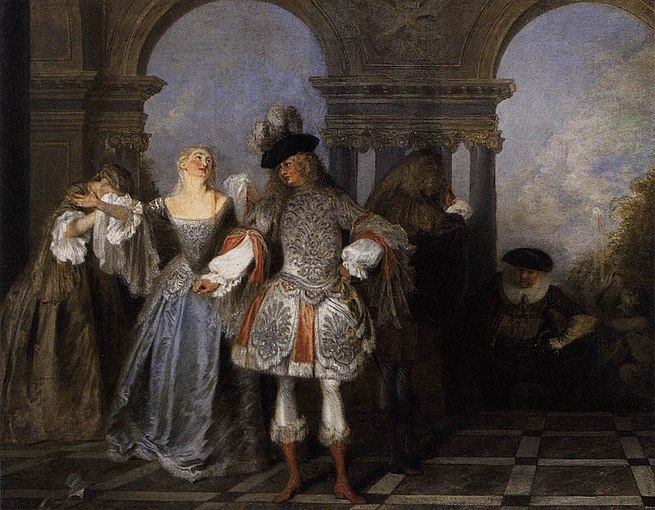
Main Difference
The main difference between Actor and Comedian is that the Actor is a person who acts in a dramatic or comic production and works in film, television, theatre, or radio and Comedian is a person who seeks to entertain an audience, primarily by making them laugh.
-
Actor
An actor is a person who portrays a character in a performance (also actress; see below). The actor performs “in the flesh” in the traditional medium of the theatre or in modern media such as film, radio, and television. The analogous Greek term is ὑποκριτής (hupokritḗs), literally “one who answers”. The actor’s interpretation of their role—the art of acting—pertains to the role played, whether based on a real person or fictional character. Interpretation occurs even when the actor is “playing themselves”, as in some forms of experimental performance art.
Formerly, in ancient Greece and Rome, the medieval world, and the time of William Shakespeare, only men could become actors, and women’s roles were generally played by men or boys. After the English Restoration of 1660, women began to appear on stage in England. In modern times, particularly in pantomime and some operas, women occasionally play the roles of boys or young men.
-
Comedian
A comedian or comic is a person who seeks to entertain an audience by making them laugh. This might take many forms including jokes, satirical observations, amusing situations, acting foolish (as in slapstick) or employing prop comedy. A comedian who addresses an audience directly is called a stand-up comedian. Other practises include the sitcom, sketch comedy and improv genres.
A popular saying, variously quoted but generally attributed to Ed Wynn, is, “A comic says funny things; a comedian says things funny”, which draws a distinction between how much of the comedy can be attributed to verbal content and how much to acting and persona.
A lot of creative and original comedy is based on surrealism and absurdity. Early pioneers in these comedic forms include Spike Milligan and Monty Python. Current examples include Vic and Bob, Noel Fielding and Sam Simmons. Elements of surreal and absurd comedy include the non-sequitur (where language or events do not follow a logical process/sequence), irony (where a message is conveyed in a way contrary to its content) and deadpan performance (in the face of surreal and absurd situations, furthering the absurdity).
Since the 1980s, a new wave of comedy, called alternative comedy, has grown in popularity with more offbeat and experimental style. Alternative comedy was initially inspired by punk culture and rejected old comedy forms, the establishment and bigoted humour. Ben Elton, Rik Mayall, Malcolm Hardee and Alexi Sayle were among the most well-known 1980’s alternative comedians. Alternative comedy experienced a revival around 2010, with Stewart Lee promoting the liberal, progressive values of the movement and many younger comedians in the UK banding together in groups dedicated to alternative comedy including The Alternative Comedy Memorial Society and the Weirdos Collective.
Many comics achieve a cult following while touring famous comedy hubs such as the Just for Laughs festival in Montreal, the Edinburgh Fringe, and Melbourne Comedy Festival in Australia. Often a comic’s career advances significantly when they win a notable comedy award, such as the Edinburgh Comedy Award (formerly the Perrier comedy award). Comics sometimes foray into other areas of entertainment, such as film and television, where they become more widely known; e.g., Eddie Izzard or Russell Brand. However, a comic’s stand-up success does not guarantee a film’s critical or box office success.
-
Actor (noun)
A person who performs in a theatrical play or film.
-
Actor (noun)
One who acts; a doer.
-
Actor (noun)
One who takes part in a situation.
-
Actor (noun)
An advocate or proctor in civil courts or causes.
-
Actor (noun)
One who institutes a suit; plaintiff or complainant.
-
Actor (noun)
One who enacts a certain policy action.
-
Actor (noun)
The entity that performs a role (in use case analysis).
-
Comedian (noun)
An entertainer who performs in a humorous manner, especially by telling jokes.
“comic”
-
Comedian (noun)
Any person who is humorous or amusing, either characteristically or on a particular occasion.
“card|cutup|gagster|joker|wag|wit”
-
Comedian (noun)
A person who performs in theatrical plays.
“actor|player|thespian”
-
Comedian (noun)
A comedies.
-
Comedian (noun)
an entertainer on stage or television whose act is designed to make an audience laugh
“a stand-up comedian”
“they sat watching an Irish comedian telling jokes”
-
Comedian (noun)
a comic actor or playwright.
-
Comedian (noun)
a person who is or thinks themselves to be amusing or entertaining
“he’s a real comedian, this fellow”
